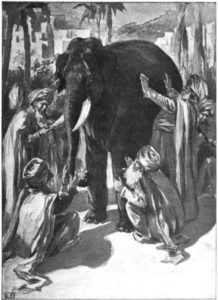There are many differences between classical and operant conditioning. The differences can make students confused if they are not critical enough to differentiate the differences.
One thing that I notice that majority of the students heavily relied on my notes (which for obvious reasons are compressed and simplified and thus, I only cover the basic things but they need to find our more on their own to understand better the concepts) and if they do not find additional information from the internet or their own reading textbook(s) and include that as a part of their notes, it would lead to surface understanding. This could be exemplified by their answer/response on the question that asked them to do a little bit of analysis/synthesis of several examples of classical and operant conditioning.
As an example, one question asked about an example of classical conditioning. So, there are four examples given and students need to identify which one is the correct example of classical conditioning. It is kind of straight forward question, isn’t it? But apparently, many students failed to get the correct answer.
Example 1: Rashid can watch the television for two hours when he finishes his homework.
Example 2: A teacher praised Kumar for writing a great essay and due to this, he works even harder when writing essays.
Example 3: Sam was scolded by his father when he failed in his science test and this makes him gets really nervous every time he takes a test.
Example 4: Lee was scolded by his teacher for passing notes to his friend in history class, but it does not stop him from passing notes in other classes.
Which of the above is an example of classical conditioning?
Let’s do an analysis and synthesis of all the examples given.
Example 1. A positive stimulus is given/presented (e.g. watching TV) after a completion of a desirable behaviour/task (e.g. complete homework). So, it is an example of operant conditioning (in specific positive reinforcement)
Example 2. A positive stimulus is given/presented (e.g. praise by a teacher) after a completion of a desirable behaviour/task (e.g. writing a good essay). The desirable behaviour would be reinforced/ increased (i.e. writing good essays) due to the positive stimulus (i.e. praise). So, it is an example of operant conditioning (in specific positive reinforcement)
Example 3: An involuntary or reflexive behavior/response is expressed/displayed (e.g. feeling nervous) after an association with negative/aversive stimuli (e.g. get scolded after getting bad results of a test). There is an association between feeling nervous (involuntary response) with scolding + bad results + test (operant conditioning does not have this association). So, it is an example of classical conditioning because the main thing is it involves natural response i.e. biological or physiological and involuntary response. You cannot control your heart beat if you are scared, don’t you? Operant conditioning does not involved biological changes i.e. response.
Example 4: This is an example that learning does not occur according to operant conditioning principle. Why? There is no change of behaviour. After getting scolded by his teacher for passing notes to his friend in history class, but it does not stop Lee from passing notes in other classes. In this case, does Lee learn something from getting scolded in history class? NOPE.
Look at the definition of learning based on operant conditioning principle: learning in which the organism studies the relation between responses and its consequences.
But, if you do a deeper analysis of the scenario using social learning theory principle, you will understand further that learning has occurred for Lee in which he learns through enactive learning that since he was scolded by a teacher in history class (i.e. his own experience), he will get scolded if he continues to pass notes in history class but this does not mean that he will stop to pass notes in another class. Why? One of the possible reasons is he still continues to pass notes in different classes because perhaps he was never scolded by teachers in another classes. For social learning theory, there are some elements of classical and operant conditioning. For example, the elements of generalisation and discrimination (classical conditioning principle). Lee learns to discriminate his action i.e. passing notes in different situations. At the same time, there is also an element of operant conditioning which is decrease of undesirable behavior (i.e. Lee does not pass note in history class) after he gets scolded by a history teacher (i.e. aversive stimuli).
So, for example 4, there is no way the example is accurate for classical conditioning.
Why do the behaviorist and social learning theories are different?
Well, it belongs to different school of thoughts in psychology and thus, the theories emphasise and hypothesise a scenario differently. This means that different theories explain a scenario differently from one another. Why is that? Let’s find the answer from the following picture. Just imagine each person represents one theory. Each person is describing one part of the elephant. Capisc? So, as we learn all the theories related to learning (even though there are many of them), we need to appreciate and understand all of the theories to understand a scenario better. Imagine you collect the information from all of the people who have touch the elephant rather than from one or two persons? You will get more comprehensive view of the elephant, right? Attaboy!
That’s why don’t undermine any of the theory that many psychologists have come out with. It is not easy for them to propose a theory and for such theory to “survive” until now. Perhaps this is what we called in Islam “beneficial knowledge – ilmu yang bermanfaat” that is passed down from one generation to another? Indeed.
P.S: I wonder what go wrong with the minds of the millenials. It seems that some of them need to work on their ability to think critically to analyse and synthesise educational scenarios. Arghh….. it does resonate with the Zimmerman’s self-regulation model. Yup. Some of them are not self-regulated learners.
